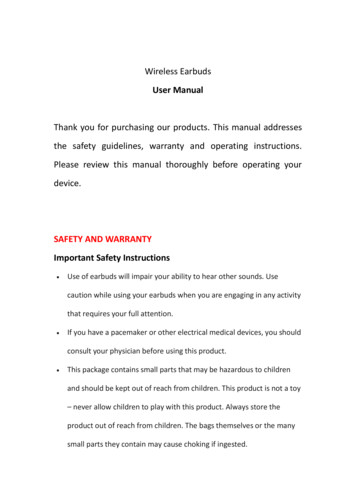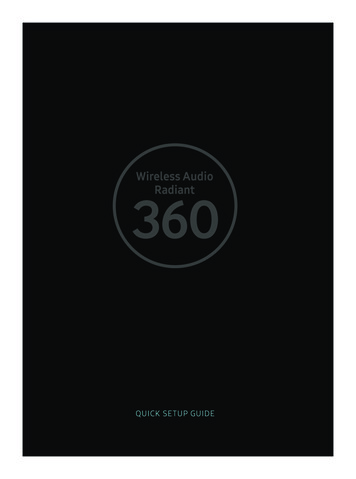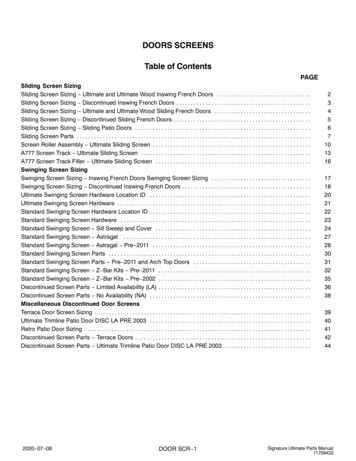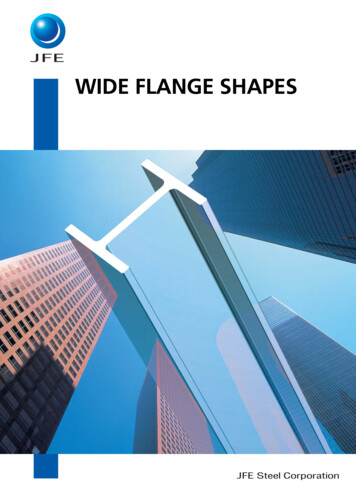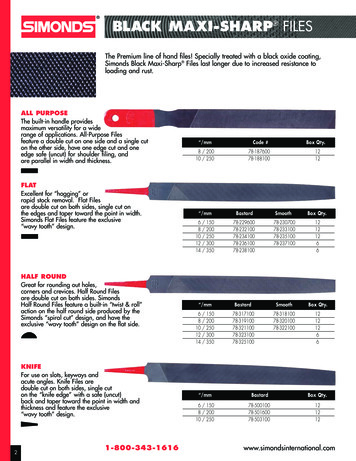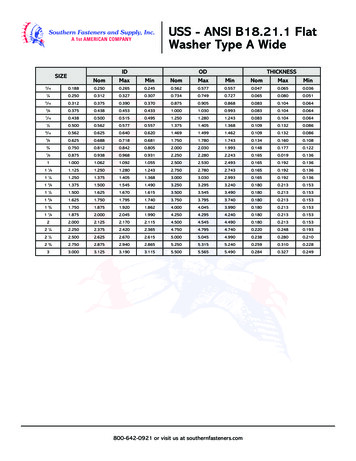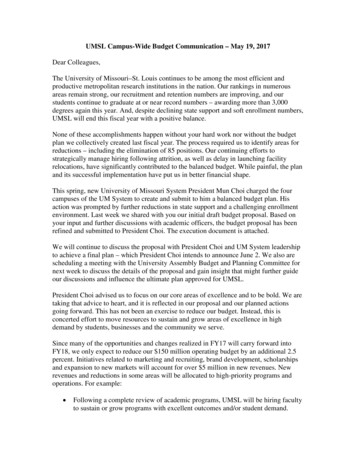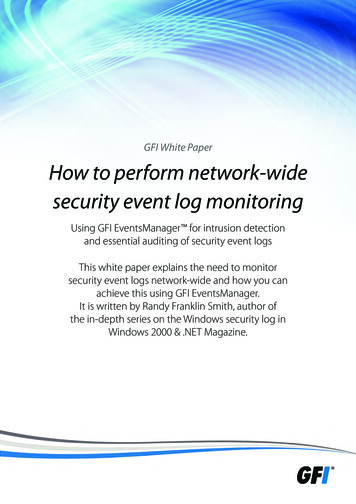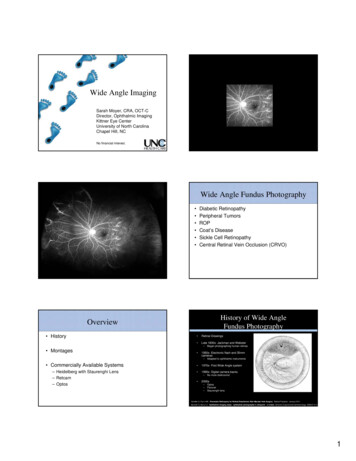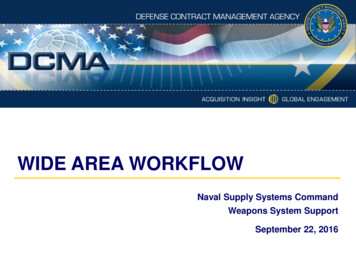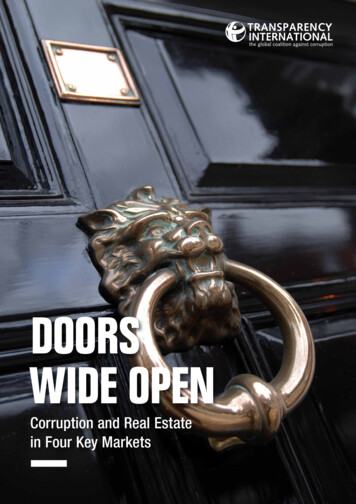
Transcription
DOORSWIDE OPENCorruption and Real Estatein Four Key Markets
Transparency International is a global movement with one vision: a world inwhich government, business, civil society and the daily lives of people are freeof corruption. With more than 100 chapters worldwide and an internationalsecretariat in Berlin, we are leading the fight against corruption to turn thisvision into reality.www.transparency.orgAuthor: Maíra MartiniProject coordinator: Maggie Murphy Cover photo: iStock/ilbuscaAcknowledgements: We thank Heather Lowe, Christoph Trautvetter andJon Vrushi for their case studies. In addition, we thank Ben Cowdock,Rebecca Dobson, Gill Donnelly, Chido Dunn, Steve Goodrich, Finn Heinrich,Max Heywood, Anne Koch, Denis Meunier, Adam Ross, Shruti Shahand Mark Zirnsak.ISBN: 978-3-96076-055-9 2017 Transparency International. All rights reserved.Design: Daniela CristoforiEvery effort has been made to verify the accuracy of the information containedin this report. All information was believed to be correct as of January 2017.Nevertheless, Transparency International cannot accept responsibility for theconsequences of its use for other purposes or in other contexts.Except where otherwise noted, this work is licensed under CC BY-ND 4.0 Transparency International 2017. Some rights reserved.Generous support for this report was providedby the Financial Transparency Coalition.
Doors Wide Open Corruption and Real Estate in Four Key MarketsContentsAbbreviations4Executive Summary5Key Findings6Country Findings8Key Recommendations10Methodology9Introduction11The Problem: How the Corrupt Purchase LuxuryReal Estate in Key Markets13Problem 1. Inadequate coverage of anti-money laundering provisions13Problem 2. Identification of the beneficial owner of legal entities, trusts andother legal arrangements is still not the norm14Problem 3. Foreign companies have access to the real estate marketwith few requirements or checks16Problem 4. Over-reliance on due diligence checks by financial institutionsleads to cash transactions going unnoticed19Problem 5. Insufficient rules on suspicious transaction reports and weakimplementation20Problem 6. Weak or no checks on politically exposed persons and their associates22Problem 7. Limited control over professionals who can engage in realestate transactions: no “fit and proper” test23Problem 8. Limited understanding of and action on moneylaundering risks in the sector24Problem 9. Inconsistent supervision26Problem 10. Lack of sanctions28Recommendations30Annex323
Abbreviations4AML/CTFAnti-Money Laundering / Counter Terrorist FinancingFATFFinancial Action Task ForceFINTRACFinancial Transactions and Reports Analysis Centre of CanadaFinCENFinancial Crimes Enforcement Network (US)GTOGeographic Targeting OrdersG20Group of 20HMRCHer Majesty’s Revenue and CustomsOECDOrganisation for Economic Co-operation and DevelopmentPEPPolitically exposed personSTRSuspicious Transaction ReportSARSuspicious Activity ReportUNODCUN Office on Drugs and Crime
Doors Wide Open Corruption and Real Estate in Four Key MarketsExecutive SummaryThe real estate market has long provided a way for individuals to secretly launder or investstolen money and other illicitly gained funds. Not only do expensive apartments in New York,London or Paris raise the social status of their owners and enhance their luxurious lifestyles,but they are also an easy and convenient place to hide hundreds of millions of dollars fromcriminal investigators, tax authorities or others tracking criminal behaviour and the proceeds ofcrime. According to the Financial Action Task Force (FATF), real estate accounted for up to 30per cent of criminal assets confiscated worldwide between 2011 and 2013.1Several cases that have come to light in the past year, including the trial of Teodoro Obiang,son of the president of Equatorial Guinea;2 Malaysia’s 1MDB scandal;3 the Brazilian Car WashOperation;4 and the Panama Papers’ revelations,5 offer examples of how high-end propertyin key markets may have been used to launder money. In many such cases, property ispurchased through anonymous shell companies or trusts without undergoing proper duediligence by the professionals involved in the deal.The ease with which such anonymous companies or trusts can acquire property and laundermoney is directly related to the insufficient rules and enforcement practices in attractivemarkets. The countries analysed in this study – Australia, Canada, the United Kingdom andthe United States – have committed in different forums, such as through the FATF and theGroup of 20 (G20), to do more to prevent and curb money laundering and terrorist-financing,including by regulating gatekeepers, such as real estate agents, lawyers and accountants, whomay act as facilitators in transactions that can enable money laundering.This report identifies the main problems related to real estate and money laundering in thesefour countries and finds that, despite international commitments, current rules and practicesare inadequate to mitigate the risks and detect money laundering in the real estate sector.1.FATF, Money laundering and terrorist financing vulnerabilities of legal professionals, Paris: FATF, 2013. ls.pdf2.United States Senate Permanent Subcommittee on Investigation, Keeping foreign corruption out of the United States: Four casehistories, 4 February 2010. ates-four-case-histories3.United States Department of Justice, Press Release, 20 July 2016. sian-sovereign; also see: load4.Schoenburg, T., J. Brice and E. Larson, ‘Brazil’ ‘Carwash’ probe yields largest-ever corruption penalty’, Bloomberg, 21 December2016. 5.International Consortium of investigative Journalists, Panama Papers. https://panamapapers.icij.org/5
KEY FINDINGSThis assessment identifies the following 10 main problems that have enabledcorrupt individuals and other criminals to easily purchase luxurious propertiesanonymously and hide their stolen money in Australia, Canada, the UK and the US.61Inadequate coverage of anti-money laundering provisions2Identification of the beneficial owners of legal entities, trusts and other legalarrangements is still not the norm3Foreign companies have access to the real estate market with fewrequirements or checks4Over-reliance on due diligence checks by financial institutions leads to cashtransactions going unnoticedNone of the countries analysed – Australia, Canada, the UK or the US – is fullycompliant with their international commitments on anti-money laundering. They all failto extend due diligence requirements to the full range of non-financial professionalsand businesses that might be involved in the buying and selling of real estate.Only in the UK are professionals involved in real estate closings required to identifythe true, actual person who is the beneficial owner of the property as part of their duediligence process. In Australia, Canada and the US the law does not require real estateagents, lawyers, accountants, notaries or any other person involved in real estateclosings to identify the beneficial owner of customers.There are few requirements and checks on foreign companies and individuals wishingto purchase property. In all the four countries, foreign companies do not need to provideinformation on their real owners to any sort of company registry in order to purchaseproperty or to the land registry upon registration. Australia is the only country thathas any checks on foreign investment, but these are not designed to prevent moneylaundering. The UK has committed to adopt legislation to establish a register disclosinginformation on the beneficial owners of foreign companies owning or seeking topurchase property by April 2018.Three of the four countries do not require a sufficient range of professionals toconduct the necessary due diligence checks on real estate transactions. They relyheavily on checks by financial institutions alone, which may lead to cash transactionsgoing unnoticed. In Australia and the US, only financial institutions have anti-moneylaundering obligations in the real estate sector. In Canada, the anti-money launderingframework includes other relevant actors, but fails to cover categories that playimportant roles in the sector, such as lawyers and Quebec notaries. The UK obliges awider range of professionals operating in the sector to conduct due diligence.
5Insufficient rules on suspicious transaction reports and weak implementation6Weak or no checks on politically exposed persons and their associates7Limited control over professionals who can engage in real estate transactions: no “fitand proper” test8Limited understanding of and action on money laundering risks in the sector9Inconsistent supervision10In Australia and the US, professionals involved in real estate closings are not required to submitsuspicious transaction reports (STRs). In Canada, real estate agents and developers, accountantsand British Columbia notaries are required to submit an STR to the Financial Transactions andReports Analysis Centre of Canada (FINTRAC) if they have reasonable grounds to suspect that thetransaction is related to a money laundering offence or a terrorist activity financing offence, butlawyers and Quebec notaries are not subject to this requirement. In the UK, real estate agents,accountants and lawyers are required to submit an STR if they suspect money laundering.In Australia, Canada and the US, professionals involved in real estate closings are not requiredto verify whether customers are politically exposed persons (PEPs), or family members or closeassociates of PEPs. This means that they do not have to conduct enhanced due diligence inthese cases. In the UK, enhanced due diligence must be applied in the case of foreign PEPs, butnot domestic PEPs.None of the countries analysed have “fit and proper tests” for professionals working in thereal estate sector, in order to assess whether they are aware of their anti-money launderingobligations. Only the UK requires real estate businesses to register with Her Majesty’s Revenueand Customs (HMRC) for anti-money laundering supervision, but compliance with this obligationis low.National money laundering risk assessments have been conducted in Canada, the UK andthe US and in all cases high risks of money laundering have been reported in the real estatesector. In Australia, while no risk assessment has been conducted in the past six years, currentgovernment documents highlight high risks of money laundering in the real estate sector.Despite these assessments, governments have been slow to adopt mitigation measures againstthe vulnerabilities identified.In Australia and the US, professionals involved in real estate closings are not subject to antimoney laundering obligations, and therefore are not monitored by competent authorities or selfregulated bodies. In the UK, the supervisory regime is inconsistent, with different supervisorybodies tasked with regulating or supervising different professions connected to the real estatesector, not all of which take a risk-based approach to supervision. In Canada, FINTRAC is thesole supervisory body for compliance with the anti-money laundering and terrorist financinglegislation and takes a risk-based approach to supervision, but enforcement of the rules in thereal estate sector is still limited.Lack of sanctionsIn all four countries, supervisory bodies publish very limited information on their enforcementefforts in the real estate sector. Both administrative sanctions for non-compliance with antimoney laundering obligations and criminal sanctions for involvement in money launderingschemes and predicate offences seem to be rare. While several financial institutions have beensanctioned for their involvement in money laundering in recent years, very little is known aboutthe sanctions incurred by real estate agents, lawyers, accountants and notaries for facilitatingmoney laundering into the real estate sector.7
Country FindingsCanadaDeficiencies inOur analysis identified 10 mainareas where legal loopholes or weakimplementation/enforcement enablethe corrupt and other criminals tolaunder money through the real estatesector. All the countries analysedhave deficiencies, which vary froman absence of anti-money launderingregulations in the sector, to weak legalframeworks and a lack of enforcement.areasUSDeficiencies in9/10areasAustraliacanadaAustralia has severe deficiencies under all 10 areasidentified in the research and is therefore not in linewith any of the commitments to tackle corruption andmoney laundering in real estate made in internationalforums.Canada’s legal framework has severe deficienciesunder four of the 10 identified areas. In the other six,there are either significant loopholes that increase risksof money laundering through the real estate sector orsevere problems in implementation and enforcement ofthe law.In Australia, real estate agents are not subject to theprovisions of the Anti-Money Laundering and CounterTerrorism Financing Act 2006. Other professionalssuch as lawyers and accountants who may also playa role in the sector are not covered either. This meansthat properties can be bought and sold without anydue diligence on the parties. Currently there are norequirements for real estate agents or any professionalinvolved in real estate deals to submit STRs, even ifthey suspect illegal activity is taking place, and thereare no requirements or rules for verifying whethercustomers are PEPs or their close associates.Of the countries analysed, only
Inadequate coverage of anti-money laundering provisions 13 Problem 2. Identification of the beneficial owner of legal entities, trusts and other legal arrangements is still not the norm 14 Problem 3. Foreign companies have access to the real estate market with few requirements or checks 16 Problem 4.
